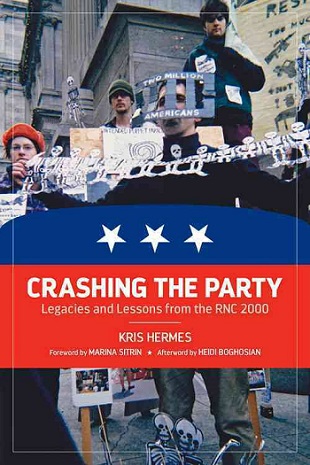 Reviewed: Crashing the Party: Legacies and Lessons from the RNC 2000, by Kris Hermes. Oakland: PM Press, 2015 278 pages, paperback, $22.95
Reviewed: Crashing the Party: Legacies and Lessons from the RNC 2000, by Kris Hermes. Oakland: PM Press, 2015 278 pages, paperback, $22.95
Once the march is over, the blockades removed, the tear gas dissipated — another fight is only just beginning, one that may last for years, require thousands of dollars and endless hours of work, and which may determine whether protestors go to prison or go free.
Crashing the Party provides an extended case study of one such campaign, that of the R2K Legal Collective, supporting protestors against the 2000 Republican Convention in Philadelphia. The city government sought to control protests with draconian restrictions, protest areas surrounded by chain link fences and police, and the denial of permits. Police addressed them with infiltration, pre-emptive raids, both mass and targeted arrests, and violence. Jail guards, with the usual bad conditions and the occasional use of torture. Prosecutors, with hyperbolic charges, exorbitant bail, threats of long sentences, and a refusal to negotiate. The protestor/defendants and their supporters meanwhile resisted in every way they could, skillfully finding pressure points, procedural bottlenecks, moments when demands could be made, places where cooperation could be withheld. They refused to give their names, turned down plea deals, publicly exposed police abuse and judicial bias, and sometimes argued their own cases. In the end, out of 420 arrests, there were thirteen misdemeanor convictions and one felony. None of the RNC defendants were jailed after conviction.
By recounting this story, Crashing the Party shows us some of the possibilities of legal defense, and outlines strategies to realize them (as well as the counter-strategies the state may employ). Had it been available sooner, I can think of numerous people I would have given this book to over the past few years — defense committees short of ideas, panicking defendants facing felony charges, lawyers skeptical of politicizing cases, ultra-militants suspicious of legal strategies. Crashing the Party is not a how-to guide, but that is where it will go on my bookshelf, alongside Brian Glick’s War at Home, Katya Komisaruk’s Beat the Heat, and Sacramento Prisoner Support’s Government Repression, Prisoner Support. Crashing the Party is descriptive rather than prescriptive, but the lessons are there for anyone who cares to learn them.
Though Kris Hermes was involved with R2K Legal’s efforts, the book does not read as an “insider’s account” in the usual sense. Instead, Hermes has offered something altogether more valuable: a careful, detailed accounting of what R2K Legal did, how they did it, and why, along with a sober assessment of their successes, failures, mistakes, and weaknesses. This approach is unusual, especially at such length, but if the left is serious about withstanding repression — that is, if we are serious about winning, it is exactly the kind of approach that we need.
Hermes’ book is remarkable in part for what it is not. It is not a self-aggrandizing memoir. It is not a clichéd manifesto inveighing against the injustices of the legal system, the corporate-imperial Republican agenda, and the opportunism of his rivals on the left. It is not a series of predigested talking points, a history composed on the model of the press release. Of course, the fact that such an honest, thoughtful account is remarkable says a great deal about the weaknesses of our movements.
And, unfortunately, those same weaknesses guarantee that Hermes’ book will not get the attention it deserves. The Philly RNC was fifteen years ago — which is a long time in a human being’s life, but practically three generations in movement terms. The quick turnover means that we are prone to continuously repeat the same mistakes. Crashing the Party could be a partial remedy, at least in the area of legal defense — if only we would pay attention.
Kristian Williams is the author of Our Enemies in Blue: Police and Power in America, American Methods: Torture and the Logic of Domination, and Hurt: Notes on Torture in a Modern Democracy. He lives in Portland, Oregon.
